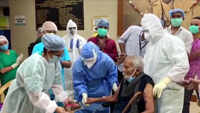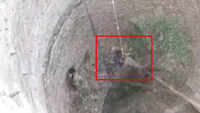
Bhubaneswar: The coronavirus pandemic has not only claimed lives and caused economic hardship, but also made humans more vulnerable to organized criminal networks.
In view of pay cuts and job loss, the Odisha government has asked its police to initiate steps for preventing human trafficking. The government apprehends that taking advantage of the pandemic traffickers may exploit innocent people.
A few days ago, the ministry of home affairs (MHA) had advised all states to remain alert and track human trafficking activity during the Covid pandemic. The MHA had told the states to strengthen their intelligence and surveillance against traffickers, identify vulnerable locations and hold regular gram sabhas for keeping the communities aware about the social menace.
Though different departments of the state government have been jointly working on the prevention of human trafficking, police have been specifically asked to address the issue.
“We have asked police to create a database of traffickers, their gangs and modus operandi of the crime. Since many, especially the migrants, are in financial distress during the pandemic, traffickers are likely to lure them with money and employment offers. But in most cases, migrants only undergo harassment and exploitation. Police should identify their intelligence mechanism in the districts,” a senior home department official said.
The police have also been asked to engage the villagers, panchayat leaders, resident welfare associations and community members in combating human trafficking. “Each panchayat may be asked to maintain a register containing all the information of children and women and track their movements to prevent any kind exploitation,” the official said.
Police sources said people in the backward districts like Kalahandi, Balangir, Nabarangapur, Rayagada and Nuapada are vulnerable to human trafficking in the form of forced labour. Poor employment opportunities in the areas normally force hundreds of labourers to approach brokers for jobs.
“Since government officials and police are busy in the enforcement of Covid-19 guidelines, they lack the time to keep vigil on human traffickers. Though police have anti-human trafficking units (AHTUs) in many districts, the officers, who man the units, are busy in their routine law and order, investigation and other duties. We need dedicated officers to check human trafficking,” said Umi Daniel, director of migration and education with Aide et Action (a voluntary organisation), said.
Police sources said at least 2500 trafficked persons, including several women and children, were rescued by them in the last three years. They added that almost all the victims were trafficked for working in brick kilns and factories in other states. In case of children, they were trafficked to Delhi and other major cities to work as domestic help. Subsequently, many of them were sexually abused, police said.
In view of pay cuts and job loss, the Odisha government has asked its police to initiate steps for preventing human trafficking. The government apprehends that taking advantage of the pandemic traffickers may exploit innocent people.
A few days ago, the ministry of home affairs (MHA) had advised all states to remain alert and track human trafficking activity during the Covid pandemic. The MHA had told the states to strengthen their intelligence and surveillance against traffickers, identify vulnerable locations and hold regular gram sabhas for keeping the communities aware about the social menace.
Though different departments of the state government have been jointly working on the prevention of human trafficking, police have been specifically asked to address the issue.
“We have asked police to create a database of traffickers, their gangs and modus operandi of the crime. Since many, especially the migrants, are in financial distress during the pandemic, traffickers are likely to lure them with money and employment offers. But in most cases, migrants only undergo harassment and exploitation. Police should identify their intelligence mechanism in the districts,” a senior home department official said.
The police have also been asked to engage the villagers, panchayat leaders, resident welfare associations and community members in combating human trafficking. “Each panchayat may be asked to maintain a register containing all the information of children and women and track their movements to prevent any kind exploitation,” the official said.
Police sources said people in the backward districts like Kalahandi, Balangir, Nabarangapur, Rayagada and Nuapada are vulnerable to human trafficking in the form of forced labour. Poor employment opportunities in the areas normally force hundreds of labourers to approach brokers for jobs.
“Since government officials and police are busy in the enforcement of Covid-19 guidelines, they lack the time to keep vigil on human traffickers. Though police have anti-human trafficking units (AHTUs) in many districts, the officers, who man the units, are busy in their routine law and order, investigation and other duties. We need dedicated officers to check human trafficking,” said Umi Daniel, director of migration and education with Aide et Action (a voluntary organisation), said.
Police sources said at least 2500 trafficked persons, including several women and children, were rescued by them in the last three years. They added that almost all the victims were trafficked for working in brick kilns and factories in other states. In case of children, they were trafficked to Delhi and other major cities to work as domestic help. Subsequently, many of them were sexually abused, police said.

Coronavirus outbreak
Trending Topics
LATEST VIDEOS
City
 Watch: 101-year-old Mumbai man recovers from Covid-19, hospital staff celebrates his birthday
Watch: 101-year-old Mumbai man recovers from Covid-19, hospital staff celebrates his birthday  On cam: Drunk man falls into 100-feet-deep dilapidated well, rescued in Andhra Pradesh
On cam: Drunk man falls into 100-feet-deep dilapidated well, rescued in Andhra Pradesh  Love for photography: Man builds 3-storey camera-shaped house in Karnataka’s Belagavi
Love for photography: Man builds 3-storey camera-shaped house in Karnataka’s Belagavi  Kochi school teacher uses Augmented Reality Technology for conducting Lower Primary online classes
Kochi school teacher uses Augmented Reality Technology for conducting Lower Primary online classes
More from TOI
Navbharat Times
Featured Today in Travel
Quick Links
Kerala Coronavirus Helpline NumberHaryana Coronavirus Helpline NumberUP Coronavirus Helpline NumberBareilly NewsBhopal NewsCoronavirus in DelhiCoronavirus in HyderabadCoronavirus in IndiaCoronavirus symptomsCoronavirusRajasthan Coronavirus Helpline NumberAditya ThackerayShiv SenaFire in MumbaiAP Coronavirus Helpline NumberArvind KejriwalJammu Kashmir Coronavirus Helpline NumberSrinagar encounter
Get the app



